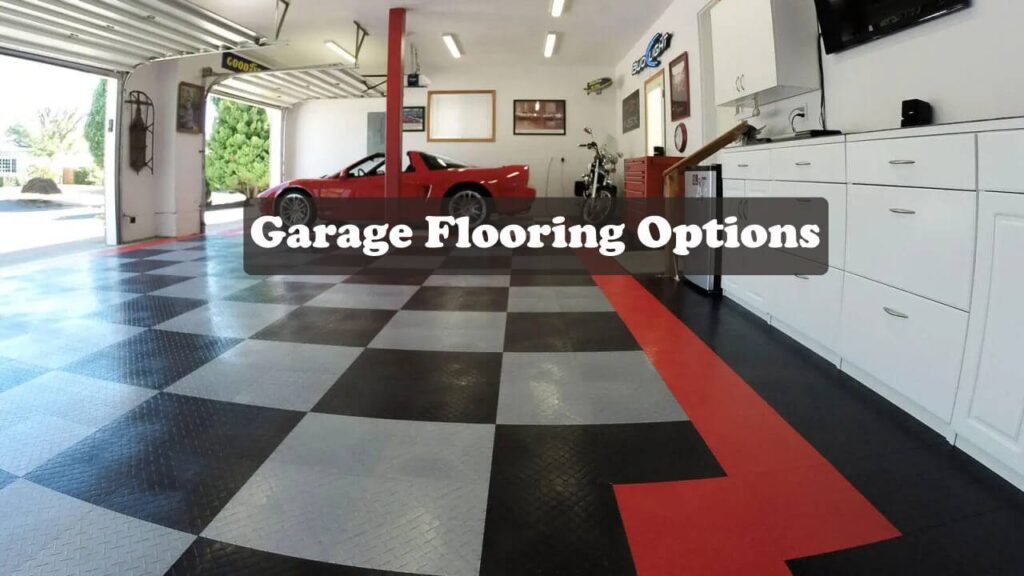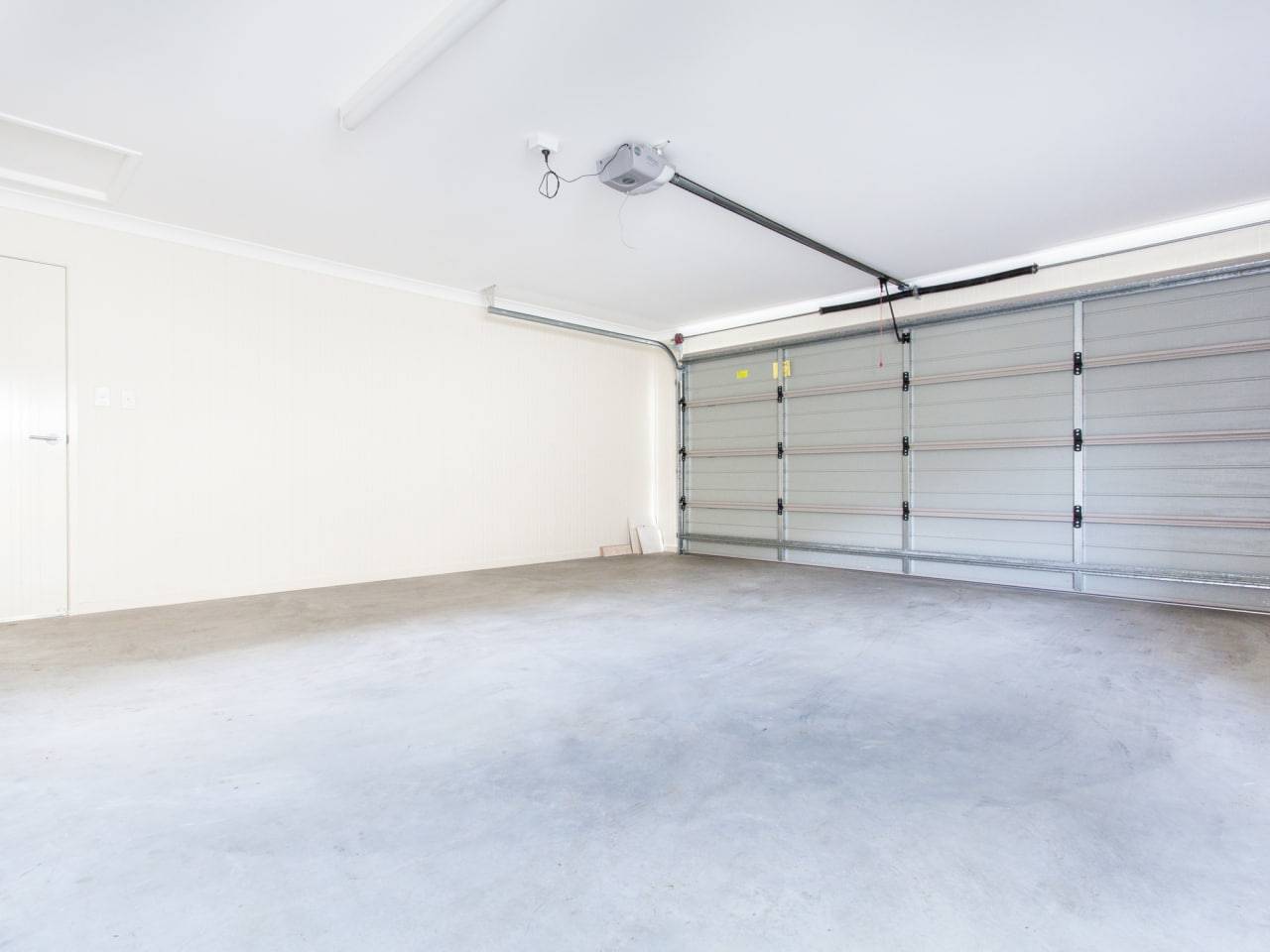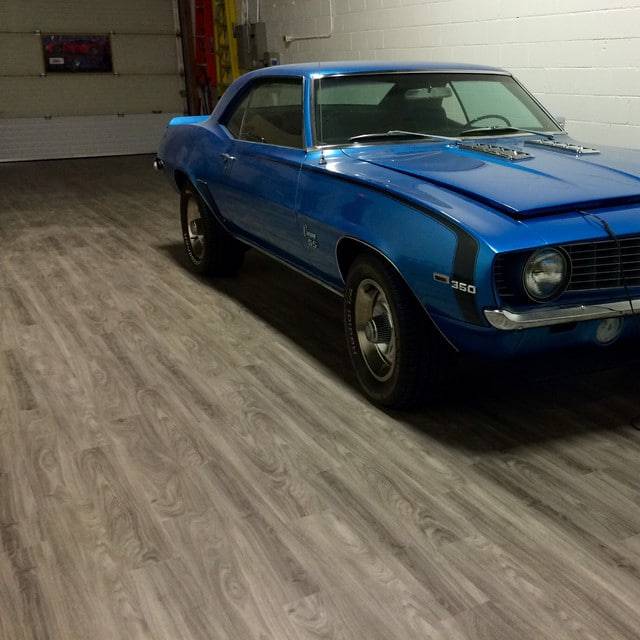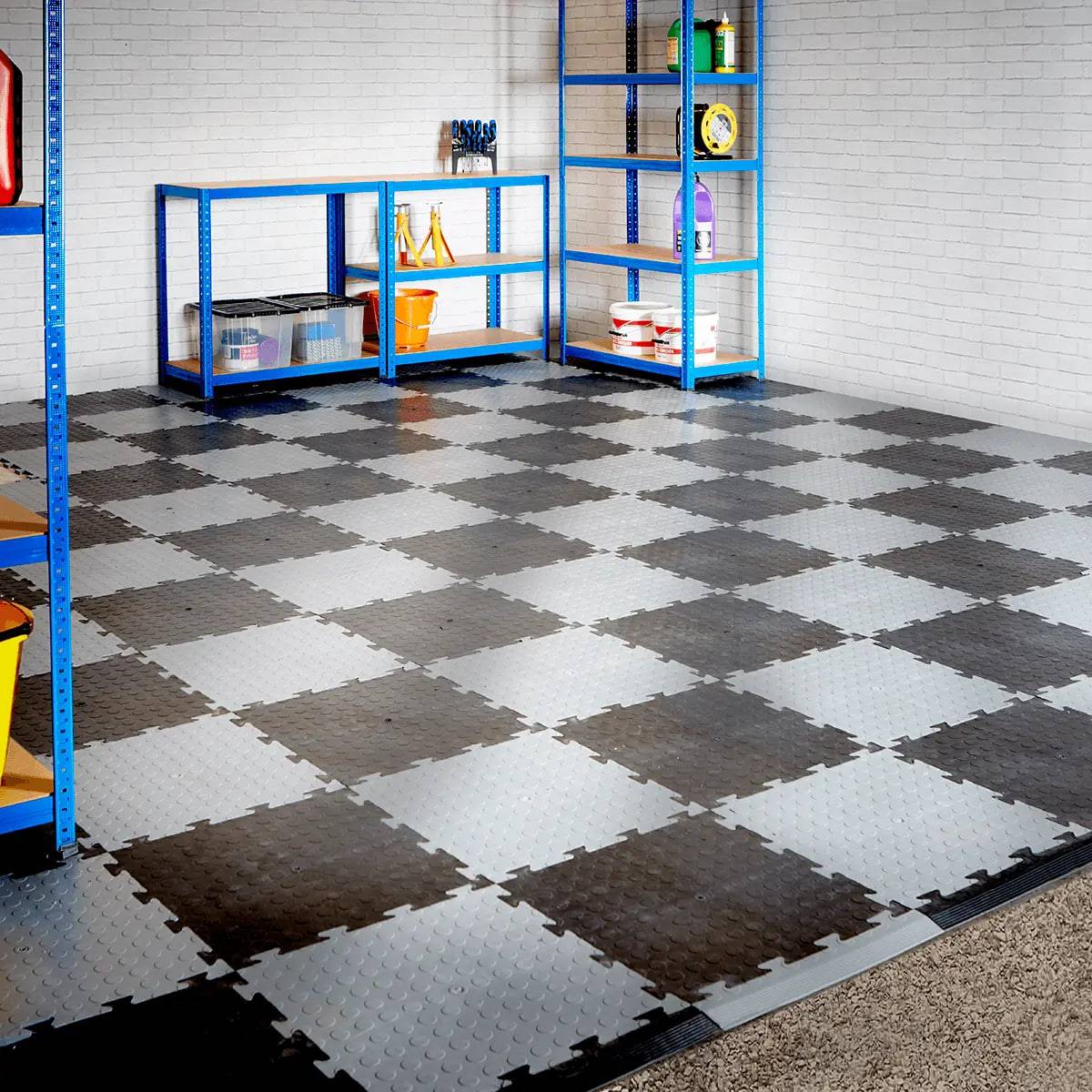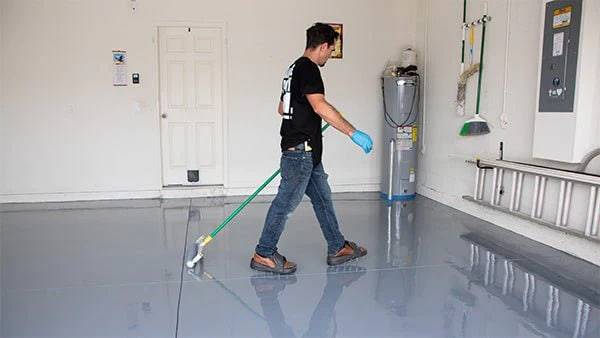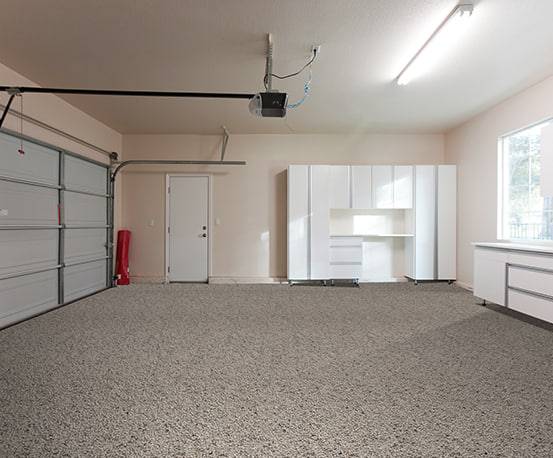Your garage can be more than just a parking spot. With a little transformation, it can become a functional extension of your living space. Whether you envision a home gym, a workshop, or a versatile storage area, the right floor will make all the difference.
This guide explores the most popular garage flooring options, considering factors like climate, budget, and maintenance needs. From classic painted concrete to durable polyurea, we’ll weigh the pros and cons of each material to help you find the perfect fit for your dream garage.
Concrete: Durable and Affordable, But Chilly
Concrete is a popular garage flooring choice for a reason: it’s incredibly strong and takes a beating from parked cars, heavy tools, and dropped objects. Plus, it’s readily available and affordable. Polished concrete offers a sleek, reflective finish, making it ideal for showcasing a classic car collection or creating a bright, airy workspace for art projects. For a more personalized touch, concrete can be painted or stained in various colors. Some paints even offer extra protection against oil and fuel spills.
However, there are downsides to consider. Concrete is naturally cold and unforgiving. Standing for long periods can be uncomfortable, and dropped tools or equipment are likely to crack. Additionally, painted concrete can chip and scuff easily, especially with regular garage use. This makes it less ideal for workshops with heavy machinery or high foot traffic. For attached garages in moderate climates, concrete is a solid option, but it might not be the best choice for uninsulated spaces or areas with extreme temperatures.
Vinyl Plank: Looks Great, Limited Durability
Vinyl flooring offers two main options for garages: vinyl plank and vinyl composite tile (VCT).
Luxury Vinyl Plank (LVT) is a popular choice for low-traffic garages thanks to its affordability and aesthetics. LVT comes in a wide variety of styles, including realistic wood-mimicking finishes, and is both waterproof and easy to maintain.
However, LVT has limitations. It’s not built for harsh climates, especially un-insulated or exposed garages. The material can become brittle or warp in extreme temperatures. Additionally, LVT isn’t designed to handle heavy vehicle loads or withstand stains from oil, grease, or leaking fluids.
Vinyl Composite Tile (VCT) is more durable than LVT due to its composition of vinyl chips and fillers like limestone. While VCT offers better stain resistance for everyday use, it requires significant maintenance to keep its shine. Regular cleaning, buffing, and waxing are necessary, and even then, car tire marks or leaks can leave permanent stains.
Transform Your Garage with Interlocking Rubber Tiles
Imagine turning your garage into a home gym or a safe play space for the kids. Interlocking rubber tiles, like those found in gyms, make this dream a reality!
These tiles offer several advantages for garage flooring:
- Comfort and Safety: Rubber provides excellent cushioning, ideal for exercise routines or creating a soft landing zone for playtime.
- Durability and Easy Maintenance: Rubber tiles are built to last, withstanding heavy weights and resisting tears. They’re also a breeze to clean – simply sweep or mop spills.
- Style and Customization: Gone are the days of boring garage floors. Rubber tiles come in a variety of colors and patterns, allowing you to personalize your space. They even have border options for a finished look.
- Versatility: Rubber tiles work well on most subfloors, making them ideal for garages with existing concrete. Plus, they cleverly hide minor cracks in the underlying floor.
- Value for Money: Rubber tiles offer a balance of affordability and functionality, making them a budget-friendly upgrade for your garage.
Epoxy Flooring: Durable, Stylish, But Requires Patience
Epoxy flooring offers a compelling upgrade for your garage, transforming a drab concrete slab into a durable, high-gloss surface. Available in a wide range of colors and even finishes that mimic granite or marble, epoxy creates a visually appealing and hard-wearing surface.
Here’s what makes epoxy a strong contender:
- Durability: Epoxy forms a tough, chemical-resistant layer that can handle heavy vehicles and dropped tools with ease.
- Aesthetics: From classic solid colors to stunning metallic or stone finishes, epoxy offers a variety of design options to elevate your garage’s look.
However, epoxy flooring isn’t without its drawbacks:
- Installation Inconvenience: Be prepared for some disruption. Epoxy application involves strong odors that require proper ventilation. Additionally, curing times can take up to 3 days, limiting garage access during this period.
- Slippery When Wet: Epoxy’s smooth surface can become hazardous when wet. Adding a textured finish during application can help mitigate this risk.
Stone Flooring: Luxe Look, Chilly Feel
For a touch of elegance, stone flooring takes the garage from utilitarian to upscale. Options like sandstone, graphite, or flagstone, available in tiles or an epoxy-bound pebble finish, create a sophisticated aesthetic when professionally installed.
However, stone flooring comes with some trade-offs:
- Pricey Investment: Stone is a high-end option, with installation costs significantly higher than other garage flooring choices.
- Cold Comfort: Stone’s natural characteristic is to be cold, making it less than ideal for spending extended periods in the garage, especially during winter.
- Porous and High Maintenance: While durable enough for parked vehicles, stone’s porous nature means spills and leaks can leave permanent stains unless professionally cleaned. The upkeep required to maintain its beauty might outweigh the initial appeal.
Stone flooring is a great choice if aesthetics are a top priority and the garage is primarily used for vehicle storage. But, for a more practical and comfortable workspace, other options might be better suited.
Conclusion
Your garage transformation journey starts with the floor! This guide has explored various popular options, each with its own advantages and considerations. By weighing factors like climate, budget, and planned use, you can select the perfect flooring solution to create your dream functional garage space.
FAQs
Q: What’s the most affordable option?
A: Painted concrete is a budget-friendly choice for moderate climates and attached garages. However, consider the potential for chipping and lower comfort compared to other options.
Q: What’s the best flooring for a home gym?
A: Interlocking rubber tiles offer excellent shock absorption and come in various colors for a customized gym feel. They’re also easy to clean and maintain.
Q: I want a stylish and durable floor. What are my options?
A: Epoxy flooring provides a beautiful, high-gloss finish in various colors and even stone-like designs. However, be prepared for curing times and potential slipperiness when wet. Stone flooring offers an undeniably luxurious look, but keep in mind the higher cost, cold feel, and porous nature that requires more maintenance.
Q: My garage is uninsulated. What flooring should I choose?
A: Avoid vinyl plank flooring, as it can become brittle in extreme temperatures. Rubber tiles and painted concrete are more versatile options for uninsulated garages.

